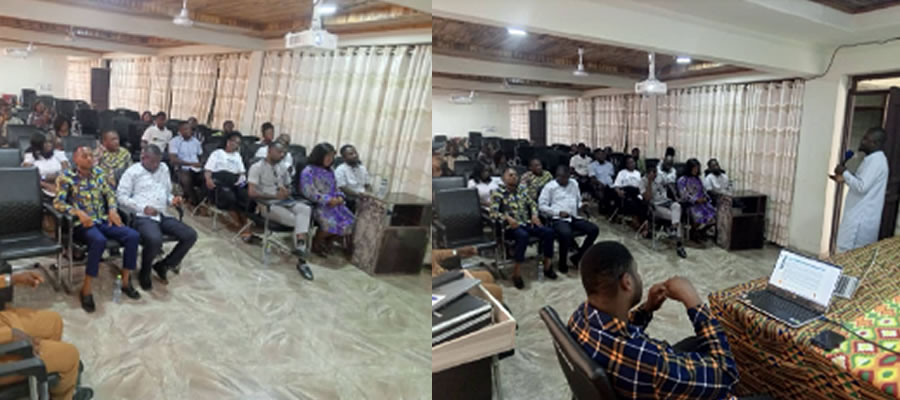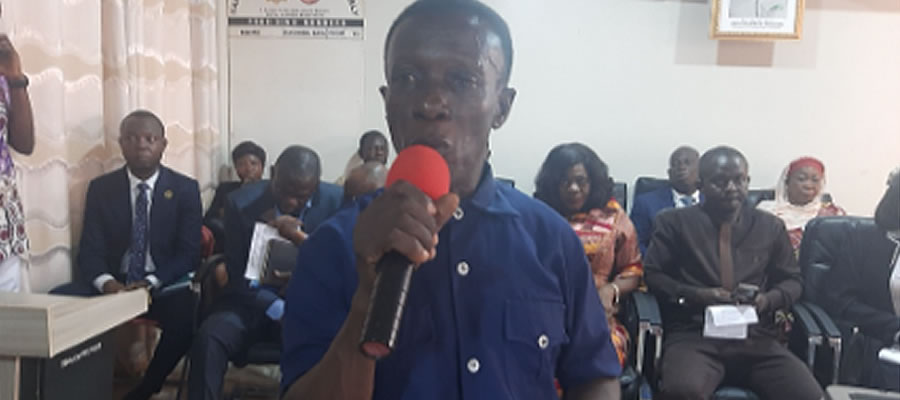

About 64 percent of people employed in the District are engaged in agriculture. 52 percent of the farmers are males and 48 percent females. The major food crops grown are maize, cassava, plantain and cocoyam. Major vegetables grown are tomato, garden egg, okro, and pepper. Industrial crops that are grown are cocoa, oil palm, coffee, and cashew.
Land tenure
According to the farmers, within a family set up, land is passed on from generation to generation of which a member is entitled to a portion of the land which he/she has and passes it on to the next of kin.
This type of land tenure system does no augur well for large commercial farming. However, settler farmers may acquire portions of land for farming activities on agreed terms. These include share cropping ie. Abunu or Abusa depending on the type of crop. Land could also be obtained through leasehold, renting or outright buying.
The Abunu is a farming system in which a piece of land is given to a farmer and crops are shared equally between the farmer and landowner. The Abusa on the other hand is a farming system in which land is given to a farmer and the crops are shared 1/3. Here the farmer takes two-thirds of the crops while the landowner takes the remaining one-third.
While food crops are cultivated in the Abunu System, cash crops are cultivated in Abusa System. Generally, the family heads are the custodians of the lands. The average farm size of a household is 4acres. However, the number of parcels for individual members varies from farm to farm.
The land tenure system has changed from a system where land was given free of charge to friends and needy ones to leasehold and share cropping (Abunu and Abusa) eg. maize / plantain, oil palm and cocoa operates on the Abunu system. With tomato, hiring of land on cash tenancy is seasonally done. (See Figure 6)
Sources of labour
With the urban drift, labour is increasingly becoming difficult to come by especially during the major cropping season (April – July). At this point, demand becomes higher for labour thereby pushing the price for weeding, harvesting and carting on the higher side. ‘By-day’ in various parts of the District ranges from ¢25,000.00 - ¢30,000.00. Young school leavers and immigrants from the North (tenant farmers) are usually the major source of labour.
Extension services
A vibrant extension delivery mechanism is in place with the inception of the unification of former departments of Ministry of Food and Agriculture (1997). The former departments are:
Department of Agric. Extension Service (DAES)
Veterinary Services Department (VSD)
Animal Production Department (APD)
Women In Agriculture Department (WIAD)
Policy Planning, Monitoring and Evaluation Department (PPMED)
Agricultural Engineering Services Department (AESD)
There are 29 MOFA Staff out of which 15 AEAS are in direct contact with the farmers with technological packages and messages and are the focal points of dissemination of technology transfer.
The current AEA – Farmer ratio is 1:2,500 which is on the high side. The ideal situation is projected to be 1:600 by 2045.
Farm technology
Agricultural Technology is available to the farmers through Agriculture Extension Agents (AEAs), NGOs, farmer to farmer, Radio and Television Programmes.
The most widely used methods by the AEAs include:
- Soil conservation using roundup, cover crops, organic manure.
- Improved seeds (planting materials).
- Row planting, paring of plantain suckers, land and water management programmes.
- Participatory technology development and extension (FFS).
- Grass-cutter rearing (Non-Traditional farming practices).
- Crop rotation, rehabilitation of cocoa farms.
- Storage (narrow cribs).
- Processing (solar dryers, shorter bush fallow system).
- Packaging cassava utilisation (pastries).
- Marketing.
- Control of pests and diseases of crops. (capsids and black pod in cocoa).
- Immunisation programmes for livestock and poultry farmers are in place (small ruminants, poultry, pets and village chicken).
All the above and other means are available to increase the productivity of the farmers if preferably adopted by all stakeholders ence planning sessions have been organised together with stakeholders.
Date Created : 11/21/2017 1:33:00 AM












 facebook
facebook
 twitter
twitter
 Youtube
Youtube
 +233 593 831 280
+233 593 831 280 0800 430 430
0800 430 430 GPS: GE-231-4383
GPS: GE-231-4383 info@ghanadistricts.com
info@ghanadistricts.com Box GP1044, Accra, Ghana
Box GP1044, Accra, Ghana